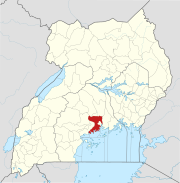|
Petroleum Authority of Uganda
The Petroleum Authority of Uganda (PAU), also known as the Uganda National Petroleum Authority, is governmental organisation that regulates the petroleum industry in Uganda, the third-largest economy in the East African Community. Its responsibilities include licensing, regulation, supervision of exploration, harvesting, refining, marketing, and disposal of petroleum products in the country. Although owned by the Ugandan government, it is expected to act independently.[4] OverviewThe law authorising the creation of PAOU is known as the Petroleum (Exploration, Development and Production) Act 2013. It was passed by the Ugandan parliament on 7 December 2012 and was assented to by the president of Uganda on 12 March 2013. The law was gazetted on 15 April 2013.[5] PAOU was established once the president named its board of directors and once Uganda's parliament approved the board members.[6][7][8] In August 2017, PAOU advertised 37 mainly managerial positions, in preparation for first oil, at that time expected in 2020.[3] Location The headquarters of PAOU is at 34-36 Lugard Avenue, in Entebbe, on the northern shores of Lake Victoria.[9] The coordinates of the headquarters of the authority are:0°03'15.0"N, 32°28'52.0"E (Latitude:0.054167; Longitude:32.481111).[10] GovernanceThe chairperson of the board was Jane Mulemwa, a Ugandan chemist and academic. Other members of the board are Bernard Ongodia, Kevin Aanyu, Noble Banadda, Lynda Biribonwa, Doreen Kabasindi Wandera and Kiryowa Kiwanuka.[11] In June 2016, Ernest Rubondo was appointed as executive director and chief executive officer of PAOU.[2] Having served the prescribed four years, the first board was disbanded and a new board was appointed and sworn in, in 2020.[12][13] In 2024, a new board was appointed by the head of state and vetted by parliament. The composition of that board as of 19 July 2024, is as illustrated in the table below.[1]
Other considerationsIn January 2019, the Cabinet of Uganda made a decision "to formally join the Extractive Industries Transparency Initiative (EITI) as a member state". According to the government spokesperson, the decision was intended "to enhance the revenue collection process, boost finances and minimize mismanagement of oil and gas revenue".[14] See also
References
External links
|
